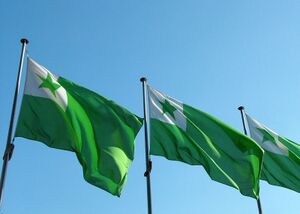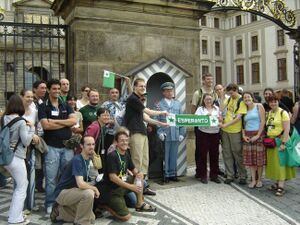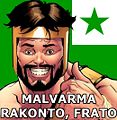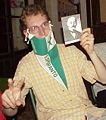- Portals
- The Current Year
- ED in the News
- Admins
- Help ED Rebuild
- Archive
- ED Bookmarklet
- Donate Bitcoin
Contact an admin on Discord or EDF if you want an account. Also fuck bots.
Esperanto


Esperanto is a language created over 120 years ago by a Jewish bicyclist in an ambitious attempt to make a new international language, while improving on the superficial flaws of previous ones, like French and Latin. It is mostly used by people too retarded to learn a real language.
Overview
A pidgin language, combining aspects of AOL speak, Leet, and Klingon. It was created as a nationalist language for Easter Island, due to the fact that the previous dialect, Easteringer, was absorbed into the sand after a terrible monsoon, resulting in the formation of several hundred gigantic stone Voraphile cockmen.
Indeca lingveto, kiu kombinas AOLan parolmanieron, Leetan parolmanieron, kaj Klinganan lingvon. Ĝi kreiĝis kiel naciisma lingvo por Paskinsulo, pro tio ke la antaŭa lingveto, Easteringero, absorbiĝis en la sablo post terura tifonego, kio rezultis en formiĝo de pluraj centoj da grandegaj ŝtonaj Vorafilaj penisuloj.
History
Esperanto was created by a dirty Pollack by the name of L. L. Zamenhof. Poland back then was part of the Russian Empire and many languages were spoken where he lived. His neighbors spoke Yiddish, German, Belorussian, Russian, Italian, and least importantly Polish. He knew all those languages at a fluent level, but he noticed that most of his neighbors could only speak one language and they fought all the time due to lack of clear communication. So Zamenhof did what any successful troll would do, learn more languages. He learned French, Latin, Greek, Hebrew and English.
Unfortunately Zamenhof got troll's remorse and decided he needed to create an easy language so people as different from each other as the Russians and Belorussians could communicate in ease. Hence he created Esperanto. He published Unua Libro on July 26, 1887. In less than a year everyone in Eastern Europe was fluent in Esperanto. It became the official language of the Soviet Union.
Since 80% of Eastern Europe was mostly Jews, when they all immigrated to America they brought Esperanto with them. Grover Cleveland became the first president to be elected fluent in Esperanto. Theodore Roosevelt was the man responsible for making Esperanto the official language of the United States of America. With German, English and Mexican having secondary status.
By 1939, Germany was one of the few countries in the planet that didn't have Esperanto as their official language, even though most of the population was fluent in it. Hitler found Esperanto to be intimidating and difficult, so he did what any reasonable man would do, create a soap factory. Stalin, Roosevelt, and Winston Churchill didn't like this, so they decided to take Hitler's lunch money and liberated the hell out of Germany.
Imageboards
Esperantochan.co.cc
Some time early in 2010, a new Esperanto chan appeared. It marked the beginning of a new age for Aspies, where they could use a new medium for their furry antics. Unfortunately as of May '10 it doesn't seem very active, which suggests that people who speak Esperanto have lives outside of the internet, which is surprising seeing as they had the time to learn a made-up language (most likely over the internet). The admin was an idiot and chose an unreliable hoster. It all finally went down the toilet, when gore spam started appearing. The mod/admin didn't do anything about it. That was the end. The site is down now.
krautchan.net/int
A guy named Nordamerikano trolled this board to no end with threads about Esperanto. Most people told him to GTFO, but he gained a few new Esperantists. Threads about Esperanto appeared a lot during late 2009 and throughout 2010.
northpole.fi/eo/
A new home for all the lost Esperantists granted by the nice people of Finland.
Trivia
- Much like using Linux or writing Star Trek fanfic, learning Esperanto will get you laid by Aspie nerds.
- Esperanto is the official language of The North American Union.
- Over 9000% of the worldpopulation can speak Esperanto.
- FACT: William Shatner starred in the first feature film ever performed entirely in Esperanto.
- Blade: Trinity has Esperanto in it too, spoken less clearly than Shatner speaks it.
- Zamenhof's daughter converted to Islam but she was killed in the Holocaust anyway, lulz
- Most Esperanto speakers are from Russia, Japan, France, and China.
- If you want to be Jew, you can stay at other Esperantists homes for freewhen traveling abroad.
- It takes 3-4 minutes to become completely fluent in Esperanto
- Esperanto is a car in the Grand Theft Auto series.
- Esperanto was featured in the tv series "Red Dwarf" frequently rimmer would try to learn it, but much like you trying to get laid, he would fail
Galerio
-
This cow speaks Esperanto better than you. In addition, she looks like your average female Esperanto speaker.
-
Victims of the Holocaust
External Links
- Finfine ni havas nian propran ĉanon!
- Learn Esperanto in this well supplied but badly organized website
- You never know when you'll need to speak dirty in Esperanto. One can never be too prepared... or can one?
- Download this program, learn to speak Esperanto with a Brazilian accent
- ABC's
- A site to induce butthurt for Esperanto-loving liberal fags
- Children are learning it!
| Esperanto is part of a series on Language & Communication | |
|---|---|
Languages and Dialects • Grammar, Punctuation, Spelling, Style, and Usage • Rhetorical Strategies • Poetry •
The Politics of Language and Communication • Media • Visual Rhetoric
Click topics to expand |

|










